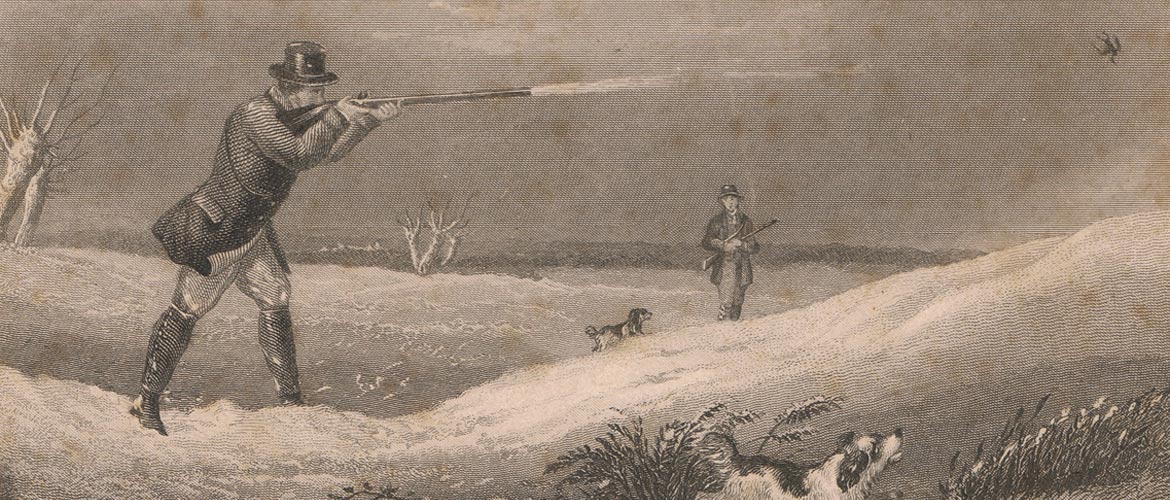 During the opening ceremonies of the 1964 Olympic Summer Games, 8,000 pigeons were released into the sky. Surely at least one member of the International Olympic Committee (IOC) breathed a sigh of relief that Léon de Lunden was not there to create what certainly would have been a public relations nightmare.
During the opening ceremonies of the 1964 Olympic Summer Games, 8,000 pigeons were released into the sky. Surely at least one member of the International Olympic Committee (IOC) breathed a sigh of relief that Léon de Lunden was not there to create what certainly would have been a public relations nightmare.
Times had changed since 1900 when Lunden, a Belgian sharpshooter, won the gold medal for what is arguably the strangest event ever to grace the pages of Olympic history.
The live pigeon shoot.
That, of course, presumes that the pigeon shoot was part of the 1900 Olympics in the first place. And, even if it was, it didn’t raise any reportorial eyebrows. Not a single newspaper column was written linking the 300 pigeons killed that day with the words “collateral damage.”
The fledgling IOC lost nearly total control of the goings-on, much to the disappointment, and subsequent embarrassment, of its president, Pierre de Coubertin.
“The 1900 and 1904 Olympic Games are usually considered the strangest in history,” said former International Society of Olympic History president Bill Mallon, who has written extensively about the modern Olympics.
“In 1900, there were numerous balloon events, along with automobile races, motorcycle races, and life-saving events,” Mallon said.
Apparently none of the life-saving events were directed toward birds.
Live pigeon shooting was not only a popular sport at the turn of the 20th century—head-to-head matches were reported in the daily papers—it was downright progressive. Historians acknowledge that between 1860 and 1909, at the peak of the sport’s popularity, pigeon shooting events were proving grounds for the development of the modern competition shotgun.
So perhaps the French organizers of the 1900 Olympics felt the event would feather the Games with a bit of upper-crust poshness and technical razzle dazzle.
What’s the French connection?
“Both the 1900 and 1904 games were side shows to World’s Fairs,” Mallon said. “The 1900 Olympics played out in the shadow of the Great Paris Exposition,” and the Fair’s organizers ran both the Fair and the Games.
And that’s where things got a bit out of hand.
The fledgling IOC lost nearly total control of the goings-on, much to the disappointment, and subsequent embarrassment, of its president, Pierre de Coubertin.
Coubertin, a 33-year-old French aristocrat, who previously vowed “to attach his name to a great educational reform,” established the IOC in 1894 to revive the Olympic Games on an international scale. His vision was to build a peaceful and better world by educating young people through sport.
Coubertin’s initial attempt, the 1896 Games in Athens, were a success. But in 1900, the line between the Exposition and the Olympics turned as blurry as an eye chart at 100 paces.
“It’s hard to sort out which events to consider Olympic sports,” Mallon said.
It’s possible the whole pigeon shooting kerfuffle wasn’t a modern-day stain on the Olympic Games at all, but rather a bunch of exuberant Europeans letting off a little steam while helping France celebrate whatever the exposition was about.
Olympic or not, the event was won by Lunden, and newspaper reports treated his victory with a level of excitement and enthusiasm that set the standard for modern-day golf announcers.
The Paris edition of the Herald-Tribune drolly described how, after Lunden shot 21 of the 300 birds killed that day, “…there was the usual rejoicing—champagne galore!”
The paper also noted the distressing news that 33 marksmen withdrew from the event, “…as much on account of the strong southwesterly wind as the stiff 10 louie entrance fee.”
The 1904 Games, held alongside the Louisiana Purchase Exposition in St. Louis, had no pigeon shooting, saving Lunden the job of defending his Olympic title. If, indeed, his title was olympian, and not part of an exposition side show.
After 116 years, it’s difficult to sort out the particulars.
Mallon cautioned not to read anything conspiratorial into pigeon shooting’s absence. “In actuality, 1904 is one of the two Olympic Games in which there were no shooting events at all,” he said. “There were no politics. The organizers just didn’t hold any.”
New York City hosted a World’s Fair in 1964, and it ran concurrently with the Summer Games. However, there was no organizational overlap. The Games were in Tokyo, a safe 6700 miles away.
On thousands of statues between the two cities pigeons, like the IOC, breathed a collective sigh of relief.
Start your Sunday with a laugh. Read the Sunday Funnies, fresh humor from The Out Of My Mind Blog. Subscribe now and you'll never miss a post.
Dr. Bill Mallon never expected his interest in the Games to amount to anything more than a hobby. He began reading, and collecting books, about the Games, in the early 1960s. What began as a hobby has survived two careers, his first as a professional golfer on the PGA tour and his second as an orthopedic surgeon. Today, his hobby has all the earmarks of a third career. Mallon was co-founder of the International Society of Olympic Historians and has served as historical consultant to the organizing committees of both the Atlanta and Sydney Olympics. He has also been a consultant statistician to the International Olympic Committee. In 2001, Mallon was awarded the Olympic Order in silver for services to the Olympic movement. He’s authored 27 books about the modern Games.
Mind Doodle…
Like college freshmen, pigeons can learn to tell the difference between paintings by Monet and Picasso as well as musical compositions by Bach and Stravinsky. Unlike college freshmen, however, pigeons can be educated for peanuts.

Fascinating. I am glad killing animals is no longer part of either the Olympics or World Fairs. Pigeons are also monogamous (so I have heard). I did not know they were aesthetically smart too.
Hi Jacki…
As far as I know, the 1900 Olympics was the only time live animals were killed as part of the games.
Pigeons are not only aesthetic, they’re valuable. Or they were. Unlike today, their droppings used to be highly prized as fertilizer—so much so that owners hired guards to protect them. Not the pigeons, the “leftovers.”
— jay
Can’t believe how you keep turning out these well-researched and funny articles. I know it’s a full time job, but still…. I’m sure you’re collecting them for an upcoming book… am I right?
Hi Nick…
It’s turned into a full-time job. That wasn’t exactly the plan. But for many of these stories, once I look into them I can’t stop. There are all these angles that nobody seems to talk about. I realized the other day that if I didn’t have deadlines for posting the stories I’d never stop researching them.
I hadn’t thought about doing a book until about a month ago. Then I started thinking about a title, and all I could come up with was “Totally Unrelated Stuff.”
I’m guessing I have to do better.
— jay